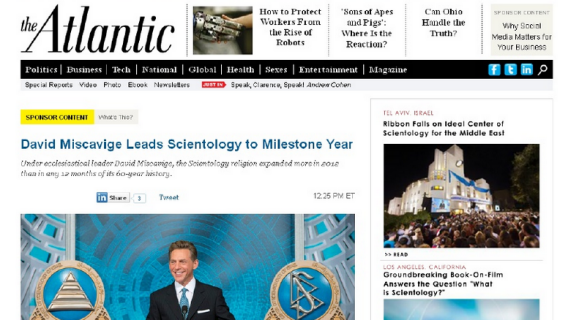The Atlantic Yanks Scientology Advertorial After Outcry

Screenshot of the since-pulled Scientology advertorial from The Atlantic's website.
[Updated at bottom with the Atlantic's latest statement.]
The Atlantic pulled an advertorial package singing the praises of the Church of Scientology and its leader, David Miscavige, last night after the sponsored content drew the attention—and ire—of both reporters and readers, and no doubt sparked an untold number of newsroom conversations about the ethics and optics of such revenue-generating efforts.
In place of the the advertorial headlined "David Miscavige Leads Scientology to Milestone Year" that trumpeted the opening of a dozen new Scientology churches around the world, the magazine is now running a note to readers alerting them that the ad campaign has been temporarily halted while the magazine reviews its official policy for such sponsored content:
We have temporarily suspended this advertising campaign pending a review of our policies that govern sponsor content and subsequent comment threads.
Poynter's Julie Moos and the Washington Post's Erik Wemple both have solid rundowns on the time-line of the advertorial and the overly pro-Scientology remarks that originally dominated the comment section. (It appears as though it was the comment moderation, and not the content itself, that first raised many journalists' eyebrows.)
In short, the ad package went live at 12:25 p.m. ET yesterday and remained up for roughly eleven hours before being yanked at around 11:30 p.m. During that time it was shared more than 3,500 times on Twitter and Facebook, according to Poynter. The Post reports that the chatter trickled the whole way to the desk of Atlantic president M. Scott Havens before the decision was made to take the content down.
The advertorial—also called "native advertising" in industry parlance—is far from a new form of revenue generation for magazines and newspapers, and one that has been increasingly used online as they look to boost digital revenues. The Atlantic has been using native ads for at least the past three years, and the program now accounts for roughly half of the magazine's digital ad revenue. Other websites, ranging from Buzzfeed to Slate, have also increasingly looked to harness sponsored content to boost their bottom lines.
For long-time Atlantic readers, it would have been hard to miss the fact that the Scientology advertorial was sponsored content. It was branded as such with a yellow-highlighted SPONSORED CONTENT above the headline and kicked off with what Wemple accurately describes as a "decidedly un-Atlantic" lede, one that reads pretty clearly as ad copy for those familiar with such prose:
2012 was a milestone year for Scientology, with the religion expanding to more than 10,000 Churches, Missions and affiliated groups, spanning 167 nations — figures that represent a growth rate 20 times that of a decade ago.
For the most part, such content goes largely unnoticed, or at least uncommented upon by most readers. That wasn't the case this time, however, likely largely due to the subject of the sponsored content in question. This wasn't an advertisement for a new car or watch, but for a (in)famously secretive religion practiced by Tom Cruise and other Hollywood stars. (As anyone who's taken a good look at traffic metrics knows, any headline with the word "Scientology" in it normally proves to be catnip for a large swath of readers.)
Reporters, too, have proved increasingly interested in the church, which has been the subject of a number of exposes and investigations in recent years. In fact, New Yorker staff writer Lawrence Wright, who earned a National Magazine Award for his exhaustive reporting on Scientology, will release his new book on the church later this week. It was that book that the Atlantic's Jeffrey Goldberg was praising in a post that went live last night, several hours before the Scientology advertorial was taken down from his magazine's website.
You can check out the original advertorial below, which has been preserved on Scribd. Poynter, meanwhile, has a good rundown of the ethical questions that such advertising raises for magazines and newspapers. You can read that here.
Update 12:09 p.m.: The Atlantic released a longer statement this afternoon on the whole thing. Here it is in full:
We screwed up. It shouldn't have taken a wave of constructive criticism — but it has — to alert us that we've made a mistake, possibly several mistakes. We now realize that as we explored new forms of digital advertising, we failed to update the policies that must govern the decisions we make along the way. It's safe to say that we are thinking a lot more about these policies after running this ad than we did beforehand. In the meantime, we have decided to withdraw the ad until we figure all of this out. We remain committed to and enthusiastic about innovation in digital advertising, but acknowledge—sheepishly—that that we got ahead of ourselves. We are sorry, and we're working very hard to put things right.
***Follow @JoshVoorhees and the rest of the @slatest team on Twitter.***

